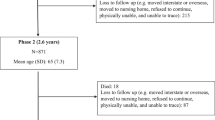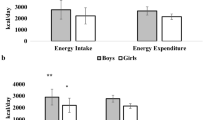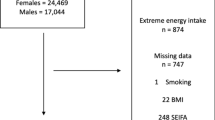Abstract
Objectives: (1) to compare dietary intake in summer and winter time; (2) to measure the change in body mass index (BMI), blood pressure and serum cholesterol between winter and summer; and (3) to determine the relationships between seasonal differences in dietary intake and BMI, blood pressure and serum cholesterol measurements.
Subjects and methods: Ninety-four male industrial employees were screened twice in one year, in their work place, at winter and summer time. Workers were recruited from two factories and response rate was 95%. Health-related variables, including dietary intake, blood pressure and serum cholesterol were evaluated at each season and were compared. Correlation coefficients between seasonal differences in dietary intake and in BMI, blood pressure and serum cholesterol were calculated.
Results: From summer to winter the mean values of BMI increase from 26.1 kg/cm2 to 26.6 (P=0.038), systolic blood pressure from 119.6 to 121.6 (P=0.025), diastolic blood pressure from 75.2 to 77.2 mmHg (P=0.001), total cholesterol from 200.8 to 208.6 mg/dL (P=0.001), LDL cholesterol from 125.2 to 134.9 (P=0.001) and HDL cholesterol from 42.7 to 44.3 (P=0.0084). Triglycerides levels decrease from 174 to 145 in the winter (P=0.03). Mean dietary intake of fat increases from 99.1 to 106.0 (P=0.0016), saturated fat from 43.6 to 46.3 (P=0.0137), polyunsaturated fat from 25.1 to 28.3 (P=0.0002), cholesterol from 462.0 to 497.9 (P=0.0313), sodium from 5778.5 to 8208.2 (P=0.0035), zinc from 11.6 to 12.3 (P=0.0001), vitamin B1 from 1.4 to 1.5 (P=0.002), vitamin D from 4.3 to 4.9 (P=0.0323) and vitamin E from 11.2 to 12.7 (P=0.0073). Significant correlation was shown between the seasonal increase in saturated fat and the increase in BMI (r=0.37), total cholesterol (r=0.21) and LDL cholesterol (r=0.29). Seasonal change in dietary cholesterol intake was significantly and positively correlated with serum total cholesterol (r=0.24) and LDL cholesterol (r=0.24). Blood pressure was not associated with nutritional intake variables.
Conclusions: Dietary intake in summer and winter is different as well as blood pressure, BMI and serum cholesterol. The seasonal increase in fat and cholesterol intake at winter time is associated with changes in BMI and serum cholesterol.
Sponsorship: The study was supported by the committee for preventive Action and Research in Occupational Health, the Ministry of Labor and Social Affairs, Jerusalem, Israel.
Guarantor: Dr Estela Kristal-Boneh.
This is a preview of subscription content, access via your institution
Access options
Subscribe to this journal
Receive 12 print issues and online access
$259.00 per year
only $21.58 per issue
Buy this article
- Purchase on Springer Link
- Instant access to full article PDF
Prices may be subject to local taxes which are calculated during checkout
Similar content being viewed by others
Author information
Authors and Affiliations
Contributions
Contributers: Danit Rivka Shahar, RD, PHD (Design, analyses and main writer). Paul From, MD, MOM (Design, analyses and writing counseling). Gil Harari, MSc (statistical analyses). Noga Yerushalmi, PhD (development of questionnaires and data bases). Flora Lubin, RD, MPH (development of dietary intake questionnaire and nutritional data base as well as writing counseling). Estela Kristal-Boneh, PhD (Gurantor-Prinicipal investigator-design, analyses and writing).
Rights and permissions
About this article
Cite this article
Shahar, D., Froom, P., Harari, G. et al. Changes in dietary intake account for seasonal changes in cardiovascular disease risk factors. Eur J Clin Nutr 53, 395–400 (1999). https://doi.org/10.1038/sj.ejcn.1600761
Received:
Revised:
Accepted:
Published:
Issue Date:
DOI: https://doi.org/10.1038/sj.ejcn.1600761
Keywords
This article is cited by
-
Research on the relationship between common metabolic syndrome and meteorological factors in Wuhu, a subtropical humid city of China
BMC Public Health (2023)
-
Seasonal variation in predialysis systolic blood pressure and cardiovascular events in patients on maintenance hemodialysis
Hypertension Research (2023)
-
Dependence of Seasonal Dynamics in Healthy People’s Circulating Lipids and Carbohydrates on Regional Climate: Meta-Analysis
Indian Journal of Clinical Biochemistry (2022)
-
Annual rhythms in adults’ lifestyle and health (ARIA): protocol for a 12-month longitudinal study examining temporal patterns in weight, activity, diet, and wellbeing in Australian adults
BMC Public Health (2021)
-
Seasonal variation and predictors of intradialytic blood pressure decline: a retrospective cohort study
Hypertension Research (2021)



